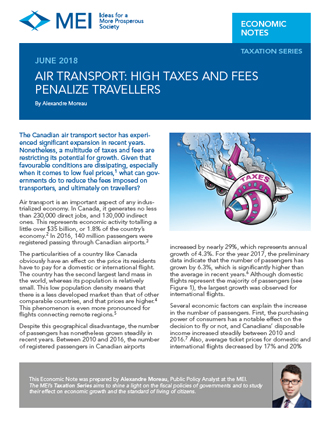Air transport: High taxes and fees penalize travellers

Montreal, June 21, 2018 – While thousands of Canadians are preparing to take off for touristic destinations, the air transport industry is weighed down by numerous taxes that raise the price of tickets and reduce its potential for growth, shows a publication launched today by the MEI.
The total revenue collected by all levels of government in the form of taxes (on fuel and on goods and services, for example), fees, and rent, either from consumers, from airlines, or from airports, exceeds $1.5 billion a year in Canada.
“That’s a lot of money. It undermines the competitiveness of airports and hurts travellers,” says Alexandre Moreau, Public Policy Analyst at the MEI and author of the publication. “For at least some of these fees, we are far indeed from the ‘user pays’ principle; they are merely a source of revenue for the government.”
For example, usage fees paid to Canadian airports by airline companies average 50% more than the average of the ten most expensive American airports, and are nine times higher than the average of the ten least expensive. Whether in terms of ticket taxes and airport fees, or the competitiveness of airport fees, Canada is respectively in the middle of the pack or near the bottom in international rankings.
“Certain factors, like low population density, entail higher prices, and there’s nothing the government can do about them. However, it could reduce the cumulative effect of the taxes and fees that limit the growth of the air transport sector and that are ultimately passed on to travellers,” explains the author.
Indeed, consumers are sensitive to the price of tickets, and a small reduction in taxes and fees would entail a larger increase in demand.
“When the United Kingdom abolished duties on passenger transport, the government’s tax revenue from the air transport sector increased,” adds Mr. Moreau. “The economic activity generated by lowering these fees and taxes would compensate in part for governments’ losses of revenue.”
Recall that in Canada, the air transport industry generates some 230,000 direct jobs, and 130,000 indirect ones. This represents economic activity totalling a little over $35 billion, or 1.8% of the country’s economy.
“If they want to make the Canadian air transport industry more competitive and allow it to maintain its momentum, governments should reduce this tax burden, in parallel with the recent policy of opening up the sector to foreign investment. While the government can’t bring Montreal and Vancouver closer, it can at least avoid making the trip more expensive than it needs to be,” concludes Michel Kelly-Gagnon, President and CEO of the MEI.
The Economic Note entitled “Air transport: High taxes and fees penalize travellers” was prepared by Alexandre Moreau, Public Policy Analyst at the MEI. This publication is available on our website.
* * *
The MEI is an independent public policy think tank. Through its publications and media appearances, the MEI stimulates debate on public policies in Quebec and across Canada by proposing reforms based on market principles and entrepreneurship.
– 30 –
Interview requests: Pascale Déry, Vice President, Communications and Development, MEI / Tel.: 514-273-0969 ext. 2233 / Cell.: 514-502-6757 / Email: pdery@iedm.org

